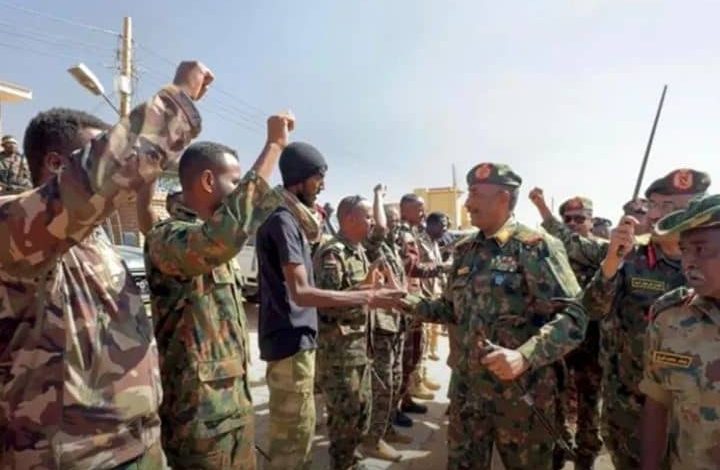Theaters of Operations: Khartoum Nears Complete Liberation

Sudan Events – Agencies
The full liberation of Khartoum and the return of its citizens are now closer than ever, as the armed forces and their allied units continue their steady advance, achieving victories across all operational fronts while the rebel militia retreats in defeat. The army’s progress in freeing the country from the rebellion has gained significant popular support, boosting the morale of soldiers on the battlefield.
Al-Burhan Inspects the Frontlines
The Chairman of the Transitional Sovereignty Council and Commander-in-Chief of the Armed Forces, General Abdel Fattah al-Burhan, stated that the army will liberate every inch of the country from the rebellion. He discussed the progress of military operations with the General Staff and expressed his gratitude to the people of East Nile for their patience, confirming that the armed forces are now near Soba and Al-Maseed bridges.
Khartoum is witnessing significant advances by the armed forces, with the liberation of several residential neighborhoods and the industrial area following the breakthrough of the armored corps.
Commander on the Ground
As the army progresses on the battlefield, General Abdel Fattah al-Burhan has conducted field visits to assess operations across several fronts. He visited Mesid Abu Saleh in East Nile, Al-Hasahisa, Wadi Sayidna, and Rufaa, where he met with military leaders and reviewed the details of ongoing battles. This reflects the leadership’s commitment to both the military strategy and the welfare of civilians.
Meanwhile, the commander of the Al-Baraa bin Malik Battalion announced on Wednesday that Khartoum’s liberation is imminent.
Foreign Ministry Responds
Alongside the military confrontation, Sudan’s Foreign Ministry is waging a diplomatic battle. In a statement yesterday, it revealed that South Sudan’s Foreign Ministry has, for the first time, acknowledged the involvement of South Sudanese mercenaries fighting alongside the Rapid Support Forces (RSF) against the Sudanese army. However, it contested claims that their numbers exceeded 65%, stating that the South Sudanese government has no control over them. Previously, South Sudanese officials had denied any knowledge of their involvement.
South Sudanese Mercenaries
The Sudanese Foreign Ministry criticized its South Sudanese counterpart for failing to condemn the crimes committed by these mercenaries or take any action to prevent their recruitment. It pointed out that South Sudan has not warned its citizens against joining the RSF as mercenaries, despite the fact that such activities violate international laws and good neighborly relations.
The ministry also cited reports from UN Security Council experts, specialized organizations, and investigative media, which have documented the support that the RSF receives through South Sudan. It dismissed South Sudan’s attempts to downplay the impact of its citizens’ involvement in the conflict.
Forced by the Militia War
The statement further noted that the South Sudanese Foreign Ministry failed to address the atrocities committed against innocent civilians who sought refuge in South Sudan to escape the RSF’s attacks, aided by South Sudanese mercenaries.
Additionally, it highlighted that over two million South Sudanese citizens have remained in Sudan even after South Sudan’s secession more than 14 years ago, continuing to receive fair treatment. While isolated incidents following the liberation of Wad Madani are under high-level judicial investigation, there has been no similar accountability for crimes committed against Sudanese citizens in South Sudan.
The ministry expressed regret that South Sudan’s statement comes at a time when Sudan is working to promote peace in South Sudan, despite its own challenges. This was evident in the peace agreement signed in Port Sudan between the South Sudanese government and the Kit Gwang faction of the SPLM-IO, under the mediation of Sudan’s General Intelligence Service. Sudan remains committed to the belief that peace and security in both nations are interconnected, and both governments continue to work toward their enhancement.
Jaber at Military Headquarters and Signal Corps
As part of ongoing military inspections, Sovereignty Council member and Assistant Commander-in-Chief of the Armed Forces, Lieutenant General Ibrahim Jaber, visited the General Command of the Sudanese Armed Forces in Khartoum.
During his visit, he met with Chief of Staff General Mohamed Osman Al-Hussein and other senior military officials, congratulating the armed forces on their recent victories. He praised the resilience of the troops, describing their determination as legendary.
Military Operations Update
General Jaber also visited the Bahri Military Command and the Signal Corps, where he was received by Major General Abdel Aziz Mohamed Abkar, the commander of the Bahri military region and Signal Corps, along with other officers and department heads.
He received a briefing on the progress of military operations and commended the personnel for the achievements of the armed forces.
Source: “Sudanese Echoes”



